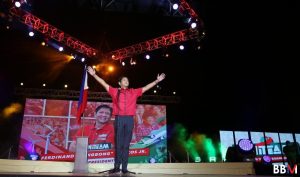Philippine presidential frontrunner Ferdinand “Bongbong” Marcos Jr. has dodged another possible hurdle in the run-up to the country’s May 9 election, with election officials dismissing three more petitions seeking to disqualify him from the race on the basis of a past conviction for tax evasion.
According to the Associated Press, a spokesperson for the first division of the Commission on Elections (Comelec) announced yesterday that the three petitions against Marcos’ candidacy, which were consolidated into one case, has been dismissed for lack of merit.
Opponents of Marcos, the son of the late dictator Ferdinand E. Marcos, have filed a number of petitions seeking to disqualify him from the race on the grounds that he was convicted of failing to file tax returns while in public office from 1982 to 1985, and then failed to declare the conviction when filing his candidacy papers. The petitioners say the conviction carries a lifetime election ban that Marcos has avoided, winning election to a number of political posts over the years, including in the Senate.
In their decision, commissioners said that the penalty was introduced in 1986, after Marcos’ offense was committed and could not be applied retroactively. They also said the court that upheld his conviction did not disqualify him. It ruled that the “deprivation of one’s right to be voted for any election should not be exercised whimsically and capriciously, lest we will be preventing qualified candidates from pursuing a position in public office.” Responding to the ruling, Marcos applauded the rejection of the “nuisance petition,” the AP reported.
The decision comes after another Comelec division last month dismissed a similar petition seeking to block Marcos from seeking office, ruling that his prior tax violations should not “render him ineligible” for the presidency.
Marcos currently holds a commanding lead in the race to succeed President Rodrigo Duterte. A survey by Laylo Research, conducted between January 17 and 23 and released earlier this week, found that he commands the support of 64 percent of voters, up 6 points from November. This compared to just 16 percent for Vice President Leni Robredo and 7 percent for Manila Mayor Isko Moreno and Philippine boxing personality Manny Pacquiao.
Bongbong’s surge toward the Malacañang Palace has reopened discussions about his family’s controversial legacy. His father, Ferdinand E. Marcos, ruled the Philippines for 31 years, including nine under Martial Law, during which time he was responsible for the murder, imprisonment, and torture of thousands of Filipinos, and the theft of billions from the national accounts. Marcos was removed from power by mass public demonstrations in 1986, and died in a disgraced exile in Hawaii three years later.
In this context, it is clear that petitioners are pursuing the case against Marcos as a proxy for the lack of accountability for the crimes committed by his father. Indeed, many of have been filed by survivors of the Martial Law period, who are rightly enraged by the prospect that the Marcoses’ reputation could be laundered by their return to the pinnacle of power.
Loretta Ann Rosales, a victim of the Martial Law era and the head of the left-wing Akbayan group, described the decision as a “major setback for the country’s electoral democracy.” In a statement, the Akbayan group described the ruling as “a missed opportunity to defend the truth and protect the public from a large-scale election swindle by a convicted tax evader.”
Rosales said that her group would continue to appeal Comelec’s decisions, meaning the struggle could soon reach the Supreme Court, providing a legal subplot to the unfolding clamor of the election campaign.

































